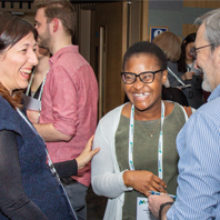Careers Focus: Networking
Issue: Oceans
05 February 2019 article

In the run up to the Annual Conference, as well as finalising your presentation and planning the talks you’ll attend, it’s worth giving some thought to networking. ‘Networking’ can conjure up images of awkward encounters and unnecessary schmoozing but really it comes down to meeting and getting to know people – building meaningful relationships that could lead to finding people to help you troubleshoot experiments, collaborate with, or even to become new friends.
If the thought of meeting new people at a busy conference fills you with dread, don’t worry, most other people are nervous too! The good news is that networking is a skill, which means that you can improve the way you do it. Also, there’s not just one way to network, so if seeing someone else in action is intimidating, bear in mind that there’s likely a different way that works better for you! Just think about the different ways you’ve made connections with your colleagues and friends. When networking at a conference there are a few things that you should think about.
The approach
Before the conference, think about what you want to get out of it – who you want to talk to, and how best to approach them. To make sure you don’t miss the opportunity, it can be a good idea to email ahead to arrange a time to meet at the conference if you know that someone you admire will be there.
The conference
At the conference, as well as attending the meetings you’ve already planned over email, don’t forget to be open to other people approaching you. A friendly approach goes a long way, particularly when visiting poster presenters during breaks. However, do read other people’s body language – if it doesn’t look like someone wants to talk, think about going back to them later. When speaking with others, you may wish to prepare a brief summary of your work and goals – an elevator pitch – to ensure you get all your key points across; and don’t forget to listen to the person you’re speaking with too. Your conversation doesn’t just have to be about work either; you can build rapport over anything from your recent sequencing misadventures to your pet cat – there’s always something to talk about.
If you feel like the conversation is drying up, make sure you have some back-up questions to hand. Questions as simple as, “what did you think of the Prize Lecture?” or, “what’s it like living in Aberdeen?” can work well. Finally, when the conversation has run its course, don’t forget to have an exit strategy so you’re not left with an awkward silence. Politely end the conversation, thank the other person for their time, and move on.
The follow up
We mentioned earlier that networking is about building meaningful relationships. Not many relationships are built on just one encounter! Make sure to get permission to get the contact details of the people you speak to, so you can follow up with a simple email to thank them for their time and share any papers or details you might have discussed during your conversation. This way you can reinforce your conversations and develop the new connection.
If you’re an early career researcher attending your first large conference, you might be interested in the pre-Conference networking event, hosted by the ECM Forum Executive Committee the day before the Annual Conference starts. The event will include some icebreaker activities, but has more importantly been very effective in helping people find other delegates to go to talks with in past years. Register during the Annual Conference registration process.
For more information on networking, check out our ‘How to Network like a Pro’ video on our YouTube channel.
